|
|
|
Sort Order |
|
|
|
Items / Page
|
|
|
|
|
|
|
| Srl | Item |
| 1 |
ID:
136221


|
|
|
|
|
| Summary/Abstract |
This paper is a local level examination of the political spaces and opportunities that arise for radical political agents in the aftermath of a climatic disaster. It explores the theoretical argument that disasters break the social contract between the state and disaster-affected communities by opening political space for change. The empirical work is based on a large-scale flooding disaster that affected southern Pakistan in 2010 and 2011 and caused international concern around increased Islamist mobilisation through their disaster relief programmes. The case study investigates the extent to which the climatic disaster opened political space for the radical Islamist group, the Jamaat-ud-Dawa, to mobilise. Based on fieldwork conducted in three districts of Sindh in southern Pakistan, this paper demonstrates that climatic disasters are able to impact radical politics. This connection is not linear or causal but rather very complex. It further explains why this type of inquiry is relevant in order to understand climate change and security
|
|
|
|
|
|
|
|
|
|
|
|
|
|
|
|
| 2 |
ID:
136552


|
|
|
|
|
| Summary/Abstract |
India and Pakistan were born into conflict in 1947 and their relationship has been among the world’s enduring rivalries ever since. In this historical context, the modest signs of progress since the resumed dialogue in February 2011 are of significance. How can these improved prospects for a more peaceful relation between Pakistan and India be explained? Departing from Liberal peace theory, this study develops an explanatory framework and investigates the impact of trade on dyadic peace processes. The empirical findings indicate that trade expectations indeed could have facilitated for a resumed dialogue between India and Pakistan. Future research may be able to attain more robust results through further specifications of the explanatory framework and additional empirical analysis.
|
|
|
|
|
|
|
|
|
|
|
|
|
|
|
|
| 3 |
ID:
137073


|
|
|
|
|
| Summary/Abstract |
This paper is a cautiously sympathetic treatment of conspiracy theory in Pakistan, relating it to Marxist theories of the state, structural functionalism and Machiavellian realism in international relations. Unlike moralising mainstream news reports describing terrorism in terms of horrific events and academic research endlessly lamenting the ‘failure’, ‘weakness’ and mendacity of the Pakistani state, conspiracy theory has much in common with realism in its cynical disregard for stated intentions and insistence on the primacy of inter-state rivalry. It contains a theory of the postcolonial state as part of a wider international system based on class-conspiracy, wedding imperial interests to those of an indigenous elite, with little concern for preserving liberal norms of statehood. Hence we consider some forms of conspiracy theory a layperson’s theory of the capitalist state, which seeks to explain history with reference to global and domestic material forces, interests and structures shaping outcomes, irrespective of political actors’ stated intentions. While this approach may be problematic in its disregard for intentionality and ideology, its suspicion of the notion that the ‘War on Terror’ should be read morally as a battle between states and ‘non-state actors’ is understandable – especially when technological and political-economic changes have made the importance of impersonal economic forces driving towards permanent war more relevant than ever.
|
|
|
|
|
|
|
|
|
|
|
|
|
|
|
|
| 4 |
ID:
135991


|
|
|
|
|
| Summary/Abstract |
There are several theoretical frameworks proposed by a wide range of scholars to explicate and understand civil and military relations. Rebecca Schiff's concordance theory is one of the recent models in this theoretical tradition. She argues that the theory of separation of civil and military relations given by Huntington not only fails to give an adequate account of domestic military interventions in Pakistan but also attempts to impose the American model of civil and military relations on it. Given the problems and flaws of the separation model, she proposes the concordance theory in place of the separation model. Schiff claims that the concordance theory provides an appropriate model to explain and to avoid military intervention in Pakistan. She purports to demonstrate that a military coup takes place due to discordance among three partners on four indicators. This article will show through the case study of Pakistan that concordance theory fails on four accounts. First, Pakistan's military coup is not the consequence of discordance but concordance. Second, there are not three partners but two. Third, the notion of four indicators runs the risk of oversimplification. Fourth, concordance theory makes somewhat the same mistake committed by the separation model attempting to superimpose the American civil and military framework upon Pakistan. This article will demonstrate that concordance theory draws the civil and military relations upon two rival approaches: abstract theoretical and multicultural approach. By consequence it goes through the internal contradiction because of which it is fated to fail.
|
|
|
|
|
|
|
|
|
|
|
|
|
|
|
|
| 5 |
ID:
135347
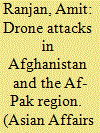

|
|
|
|
|
| Summary/Abstract |
This paper is an attempt to analyse the contentious role of drone strikes in the context of the options available in the on-going fight against terrorism in Afghanistan and the Af-Pak region. There are significant legal issues here, both in terms of human rights and in terms of state sovereignty and independence, though there are those who argue that the concept of a “just war” provides adequate justification. Pragmatists focus on effectiveness. In Afghanistan and Pakistan, there are many individuals who lend their support to the drone attacks because they see no other alternative(s), given that the prospects for dialogue seems so unpromising. But however many jihadist leaders are killed, in drone strikes, other effective counter-insurgency action may provide a better option.
|
|
|
|
|
|
|
|
|
|
|
|
|
|
|
|
| 6 |
ID:
136303
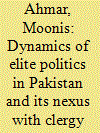

|
|
|
|
|
| Summary/Abstract |
Elite politics in Pakistan is focused on ensuring the privileged status of those classes who hold considerable influence in society. Conformist elite since the creation of Pakistan until today pursue a status quo oriented approach. Non-conformist elite is a recent phenomenon with a purpose to bring qualitative change in society, to dismantle the exploitive order, weed out corruption, and pull Pakistan from decades of stagnation and underdevelopment.
|
|
|
|
|
|
|
|
|
|
|
|
|
|
|
|
| 7 |
ID:
135646


|
|
|
|
|
| Summary/Abstract |
Home minister Rajnath Singh talked about India’s relations with China and Pakistan at the ITBP rising day
|
|
|
|
|
|
|
|
|
|
|
|
|
|
|
|
| 8 |
ID:
135198


|
|
|
|
|
| Summary/Abstract |
In the concluding pages of his fascinating memoir, War Comes to Garmser, Carter Malkasian, a Pashto-speaking U.S. diplomat who was stationed in a volatile region of Afghanistan in 2009–11, voices a fear shared by many of the Westerners who have participated in the Afghan war during the past 13 years: "The most frustrating thing about leaving Garmser in July 2011 and now watching it from afar is that I cannot be certain that the [Afghan] government will be able to stand on its own. ... The British and the Marines had put the government in a better position to survive than it had enjoyed in the past. What they had not done was create a situation in which the government was sure to win future battles against Taliban [fighters] coming out of Pakistan."
|
|
|
|
|
|
|
|
|
|
|
|
|
|
|
|
| 9 |
ID:
135172


|
|
|
|
|
| Summary/Abstract |
This article presents a descriptive analysis of terrorism in Pakistan over the past three decades. Using statistical tools, the authors disentangle terrorist violence to expose underlying trends. Continuities and discontinuities in the various types of terrorism are identified and correlated with domestic and international events. The gravity of terrorist violence is found to change from one region of the country to another in response to geopolitical events. The Khyber Pakhtunkhwa share of terrorist incidents during the last three decades fell from 45% to 5% and then rebounded to 58%. Sindh's share of terrorist incidents followed an opposite pattern over the three decades, increasing from 23% to 68% and then decreasing again to just 9%. Terrorist incidents were most frequent in the 1990s but most lethal in the 2000s. Overall, terrorist violence has followed an increasing trend. The composition of terrorist attacks (sectarian, ethnic, and non-sectarian religious) has changed over the past three decades, with sectarian terrorism emerging as the more lethal, causing almost six casualties per attack. Terrorist methods have also changed over time, with bombings becoming less prominent in the 1990s but much more common in the 2000s. The geographical distribution of terrorist incidents has likewise changed over time – national and provincial capitals were targeted 64% of the time in the 1980s and just 25% of the time today. Overall, the authors conclude that the methods and pattern of terrorist incidents change logically in response to changes in the geopolitical environment.
|
|
|
|
|
|
|
|
|
|
|
|
|
|
|
|
| 10 |
ID:
134244
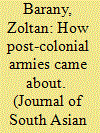

|
|
|
|
|
| Summary/Abstract |
The creation of an army loyal to the state is one of the most important institutional tasks of post-colonial leaders. But how do novice political leaders develop the capacity to subordinate the armed forces to the authority of state institutions? This essay explains alternative methods of formulating post-colonial civil–military relations and explains why four states – India, Pakistan, Ghana, and Tanzania – took such different routes of institutional development. I make two arguments. Firstly, building armed forces that willingly acquiesce to state authority is always a critical issue of regime change – whether to democracy or some other form of government – though it is more difficult to accomplish in some contexts than others. Secondly, the political and socioeconomic contexts in which armies must be built are very different and thus pose dissimilar challenges and tasks to those crafting new armies and civil–military relations. I will assess the power of several variables to explain the disparate outcomes of the four cases: the quality of political leadership and leaders’ approach to the armed forces, the strength of political institutions, ethno-religious and regional policies, civilian control mechanisms, military–societal relations, and foreign influence.
|
|
|
|
|
|
|
|
|
|
|
|
|
|
|
|
| 11 |
ID:
135619


|
|
|
|
|
| Summary/Abstract |
Is it only India that faces a two-front dilemma? Ask your friendly neighbours and they will tell you that you are not alone. While Pakistan faces a two-front dilemma (on its western border, more of its own making though), the Chinese would be hard pressed to admit that there are several ‘fronts’ open at any given time for them to deal with — most notably due internal strife.
|
|
|
|
|
|
|
|
|
|
|
|
|
|
|
|
| 12 |
ID:
134487


|
|
|
|
|
| Summary/Abstract |
India's nuclear breakout in 1998, foreshadowed as early as 1974, may have been understandable for reasons of global nuclear politics, a triangular regional equation between China, India and Pakistan, and domestic politics. Yet the utility of India's nuclear weapons remains questionable on many grounds. Nuclear deterrence is dubious in general and especially dubious in the subcontinent. Nuclear weapons are not usable as weapons of compellence or defence. They failed to stop the Pakistani incursion in Kargil in 1999 or the terrorist attack on Mumbai in 2008. They will not help India to shape the military calculations of likely enemies. And India's global status and profile will be determined far more crucially by its economic performance than nuclear weapons. Meanwhile, they do impose direct and opportunity costs economically, risk corrosion of democratic accountability, add to global concerns about nuclear terrorism, and have not helped the cause of global nuclear non-proliferation and disarmament. Because the consequences of a limited regional war involving India could be catastrophic for the world, others have both the right and a responsibility to engage with the issue. For all these reasons, a denuclearized world that includes the destruction of India's nuclear stockpile would favourably affect the balance of India's security and other interests, national and international interests, and material interests and value goals.
|
|
|
|
|
|
|
|
|
|
|
|
|
|
|
|
| 13 |
ID:
136633
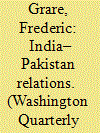

|
|
|
|
|
| Summary/Abstract |
As the new Indian government has settled in, what will happen to its relations with Pakistan? While some take comfort in the idea that the strong nationalist credentials of the new Prime Minister could facilitate a peace agreement with Pakistan, others argue that the risk of communal violence created by the Hindutva ideology1 of the new government could be a potential impediment to better India–Pakistan relations. But the evolution of the bilateral relationship is unlikely to depend on either of these considerations; it is also unlikely to depend primarily on New Delhi.
Narendra Modi's decision to invite his Pakistani counterpart, Nawaz Sharif, to his May 26, 2014, swearing-in ceremony, along with all the other heads of state or government from the South Asian Association for Regional Cooperation (SAARC), was considered a positive gesture on both sides of the border. The meeting between the two Prime Ministers was cordial and frank but—to no one's surprise—not groundbreaking. However, the two countries have already interpreted this early meeting differently.
|
|
|
|
|
|
|
|
|
|
|
|
|
|
|
|
| 14 |
ID:
136403
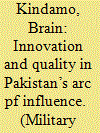

|
|
|
|
|
| Summary/Abstract |
The article discusses the role of Pakistan Armed Forces (PAF) and defence industry to protect the national sovereignty, interests and assets. It mentions the PAF's military relations with countries such as the U.S and China and international organizations such as North Atlantic Treaty Organization (NATO) for the same. It mentions the development and role of defence organizations including Pakistan Ordnance Factories, Pakistan Aeronautical Complex and Heavy Industries Taxila for the same.
|
|
|
|
|
|
|
|
|
|
|
|
|
|
|
|
| 15 |
ID:
135178


|
|
|
|
|
| Summary/Abstract |
In the aftermath of 9/11, the USA embarked on a massive global hunt for terrorists and launched its “Operation Enduring Freedom” in Afghanistan. Its failure to control insurgency in Afghanistan spilled over into Pakistan, with disastrous consequences. The resurgence of the Taliban with more formidable tactics and maneuvering skills has become more troublesome for both Afghanistan and Pakistan and for the USA and its allied forces. The fierce comeback of the insurgents has challenged the political and territorial integrity of Pakistan, one that it cannot tolerate. This article analyzes the current situation and its implications for Pakistan's security. Moreover, it looks into the internal and external security complexities that Pakistan faces and the possible implications of the US exit strategy for Pakistan's security. It concludes that the security situation in Pakistan is continuously deteriorating and no part of her territory is immune from terrorists' attacks. To be successful, Pakistan must pursue a broad-based strategy that encompasses military, political, social, economic and informational domains aimed at accomplishing four major objectives: (1) elimination of foreign terrorists and their facilitators; (2) strengthening of the political and administrative institutions in the Federally Administered Tribal Areas (FATA); (3) establishing a safe and secure environment conducive for sustained development and the realization of real socio-economic progress and (4) integrating the FATA into the national mainstream. In the long term, a strategy based on the concept of “Enlightened Moderation” is the right solution, not only to the internal problems of Pakistan but also for the Muslim world and the international community.
|
|
|
|
|
|
|
|
|
|
|
|
|
|
|
|
| 16 |
ID:
134731


|
|
|
|
|
| Summary/Abstract |
The terrorist attacks on the World Trade Center and Pentagon on 9/11 2001 had a grave impact on the way the conflict dynamics in world politics have been shaped, structured and interpreted since then. The invasions of Afghanistan (2001) and Iraq (2003), the US drone programs launched during the first decade of the 00’s in countries like Pakistan, Yemen and Somalia and the more recent interventions in Libya (2011), and Mali (2013) have all at some point been related to the concern of combatting international terrorism. To fight or prevent international terrorism still appears as a top-priority for the great powers of the West and questions about the role of religion in explaining the motivations and occurrences of terrorist acts still remain topical.
|
|
|
|
|
|
|
|
|
|
|
|
|
|
|
|
| 17 |
ID:
137093


|
|
|
|
|
| Summary/Abstract |
This article argues that in the wake of 9/11, Pakistan engaged in two policy moves that were highly problematic and controversial from a domestic perspective: the alliance with the United States, and the simultaneous disengagement with the Taliban regime. While realist accounts largely posit these moves as a consequence of US diktat, this article is more interested in exploring how the actions were enabled by a domestic political narrative. Scholarly accounts in the post 9/11 era tend to marginalise the role of indigenous agency and ‘voice’, and overwhelmingly work within frameworks that emphasise the consequential effects of US hegemony. Conversely, in examining official Pakistani political discourses, the article argues that a number of identifiable rhetorical strategies played a performative role in enabling specific Pakistani policy outcomes in the wake of 9/11. In important ways, the analysis moves away from unproblematically assuming Pakistan as simply a passive recipient of American ‘empire’.
|
|
|
|
|
|
|
|
|
|
|
|
|
|
|
|
| 18 |
ID:
135834


|
|
|
|
|
| Summary/Abstract |
Human rights groups have documented the plight of Pakistan's religious minorities for years, but it is only recently that these minorities have become the focus of academic political science discourse. This discourse, however, borrows from a well-developed liberal literature on Pakistan's democratic instability that makes assumptions about the inclusiveness of democratic regimes and exclusivism of dictatorships—most notably that of General Zia-ul-Haq. On close scrutiny, these assumptions do not hold. In this paper, I evaluate the political capacities of minorities through an institutionalised assessment of the quantity and quality of minorities’ voices in an electoral–legislative framework. Such a model, in the context of a plural society, is more likely to better reflect the capacity of a minority's ability to withstand the tyranny of the majority, and assess the potential for its integration into the political mainstream. Towards this end, I analyse the demography–representation correlates of the Christian minority in Pakistan's federal legislatures since Independence in 1947. I argue that the institutionalised Christian presence has often been sub-proportionate, lacking in authority and leverage, and tokenistic. Finally, I suggest remedial measures to improve the efficacy of minority representation and political empowerment by adapting certain voting paradigms suggested by Lani Guinier.
|
|
|
|
|
|
|
|
|
|
|
|
|
|
|
|
| 19 |
ID:
135171


|
|
|
|
|
| Summary/Abstract |
The spectacular commando-style terrorist strike on Mumbai in November 2008 exposed India's lax internal security structure. As nearly all the security apparatus broke down during the long spell of attacks, massive public outrage flared up across the country calling for a firmer government response. Shockingly, India has done little to prevent a recurrence and a new security threat faces the country every single day not merely before but even after the Mumbai attacks. In contrast, Pakistan's Inter Services Intelligence and the Lashkar-e-Taiba have successfully evaded pressures from both India and the international community and continue their terror campaign against India under the “Karachi Project” with the explicit intention to unsettle South Asia. Classified documents indicated that India is at the forefront of a cataclysmic “nuclear terrorism” threat from a “combination of Pakistan-based terrorists and homegrown radicals.” This article analyses the danger posed by the Indo-Pak radical groups targeting India and India's lack of preparedness to the new security threat from the “Karachi Project.”
|
|
|
|
|
|
|
|
|
|
|
|
|
|
|
|
| 20 |
ID:
134488
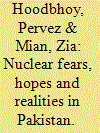

|
|
|
|
|
| Summary/Abstract |
In the four decades since Pakistan launched its nuclear weapons program, and especially in the fifteen years since the nuclear tests of 1998, a way of thinking and a related set of feelings about the bomb have taken hold among policy-makers and the public in Pakistan. These include the ideas that the bomb can ensure Pakistan's security; resolve the long-standing dispute with India over Kashmir in Pakistan's favour; help create a new national spirit; establish Pakistan as a leader among Islamic countries; and usher in a new stage in Pakistan's economic development. None of these hopes has come to pass, and in many ways Pakistan is much worse off than before it went nuclear. Yet the feelings about the bomb remain strong and it is these feelings that will have to be examined critically and be set aside if Pakistan is to move towards nuclear restraint and nuclear disarmament. This will require a measure of stability in a country beset by multiple insurgencies, the emergence of a peace movement able to launch a national debate on foreign policy and nuclear weapons, and greater international concern regarding the outcomes of nuclear arms racing in South Asia.
|
|
|
|
|
|
|
|
|
|
|
|
|
|
|
|
|
|
|
|
|